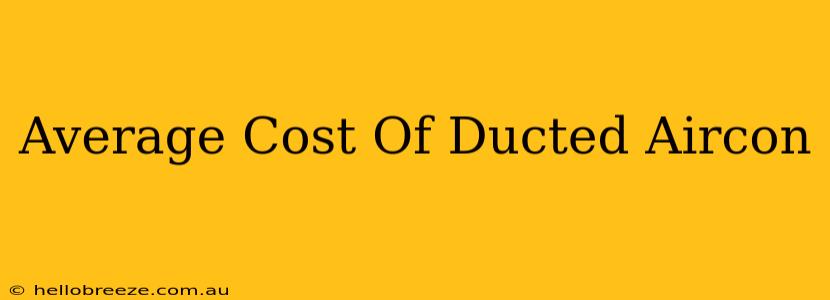Are you considering installing ducted air conditioning in your home? It's a significant investment, so understanding the average cost is crucial before you begin. This comprehensive guide breaks down the factors influencing the price of ducted air conditioning, helping you budget effectively and make an informed decision.
Factors Affecting the Cost of Ducted Air Conditioning
Several factors contribute to the overall expense of a ducted air conditioning system. Knowing these will help you better understand your potential costs:
1. System Size and Capacity:
This is arguably the most significant factor. Larger homes require larger systems with higher capacity (measured in kilowatts or kW). A larger system naturally costs more to purchase and install. Accurate assessment of your home's size and insulation is vital for determining the right system size. Undersized systems struggle to cool effectively, while oversized systems are wasteful and more expensive.
2. Type of System:
Ducted air conditioning systems come in several varieties, each with its own price point:
- Reverse-cycle systems: These offer both heating and cooling, generally costing more upfront but saving money in the long run.
- Single-zone systems: These cool only a single area, typically less expensive than multi-zone systems.
- Multi-zone systems: Offering individual climate control for different areas of your home, these systems are more complex and consequently more expensive.
3. Brand and Model:
Different brands offer varying levels of quality, features, and efficiency. Premium brands often come with a higher price tag but may offer longer warranties and better energy efficiency. Researching different brands and models allows for informed comparisons based on your budget and needs.
4. Installation Complexity:
The complexity of the installation significantly impacts the cost. Factors include:
- Home size and layout: Larger, more complex homes with multiple levels or difficult-to-access areas will increase installation time and labor costs.
- Existing ductwork: If you have existing ductwork that can be reused, you might save some money. However, new ductwork installation can add considerably to the overall cost.
- Location of the air conditioning unit: Placement of the outdoor unit needs consideration; factors like proximity to power and accessibility will affect the installation time.
5. Additional Features:
Many modern ducted air conditioning systems offer additional features, each influencing the price:
- Smart home integration: Control your system remotely through a smartphone app.
- Zoned climate control: Allows for individual temperature settings in different rooms.
- Advanced filtration: Provides better air quality.
- Energy-efficient features: Minimizes running costs.
Average Cost Breakdown:
While exact figures vary widely based on the factors above, here's a rough estimate:
- Basic system (small home, single-zone): $5,000 - $10,000
- Mid-range system (medium home, multi-zone): $10,000 - $20,000
- High-end system (large home, advanced features): $20,000+
It's crucial to get multiple quotes from reputable installers. This ensures you get a competitive price and understand all aspects of the installation process. Don't hesitate to ask questions about the system's efficiency, warranty, and ongoing maintenance costs.
Saving Money on Ducted Air Conditioning:
- Shop around for quotes: Get at least three quotes from different installers.
- Consider energy efficiency: Invest in a high-efficiency system to lower your running costs over time.
- Explore government rebates and incentives: Many governments offer incentives for energy-efficient home upgrades.
- Properly insulate your home: Reduces the load on your air conditioning system.
Investing in ducted air conditioning is a significant decision, but with careful planning and research, you can find a system that fits your budget and cooling needs. Remember to factor in all the costs involved—including installation—and get multiple quotes for the best possible price.

